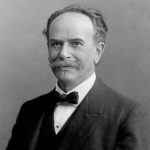1.3: Franz Boas and the birth of American anthropology
- Page ID
- 39122

Franz Boas is widely regarded as the father of cultural anthropology in the United States. Boas was a German of Jewish heritage (though from a not religiously observant family). Educated in Germany, Boas was exposed to two competing intellectual traditions, the Naturwissenschaften (natural sciences) and the Geisteswissenschaften (human sciences). Boas embraced both, as a student of physics on the one hand and geography on the other. In 1896, Boas immigrated to the United States (Liron, 2003). Without the contributions of Boas, American anthropology might have developed very differently.
Unlike the British scholars of the time, Boas insisted that the study of culture should be based on careful observation, not speculation, which was the tendency of writers like Matthews and Tylor. Boas spent many years studying Native American cultures, and over the course of his career, he collected volumes of information on linguistics, art, dance, and archaeology. Boas’ studies convinced him of the sophistication of Native cultures, so in contrast to Tylor, Boas and his students rejected the idea of indigenous cultures as inferior stages along the route to civilized refinement presumably represented by “Western” cultures (Franz Boas, 2017).
In fact, Boas is responsible for a number of tendencies in American anthropology:
For one thing, as we have just suggested, Boas rejected the idea that culture was something that evolved within societies by stages from lower forms to higher. Instead, he argued that culture was a historical, not an evolutionary development. Boas insisted that cultural ideas and practices diffused across groups who were living in proximity and interacting within similar environments. For Boas cultural developments were in many ways just accidents of history (Franz Boas, 2017).
Moreover, Boas was a vehement opponent of the scientific racism of the era (Liron, 2003). Scientific racists pushed the idea that race was a biological characteristic and that it was possible to explain human behavior by appealing to racial differences. During the 19th and 20th centuries, scientific racism had many proponents, not just in Europe and North America but as far away as China and Japan (Dikötter, 1992). Many anthropologists in Boas’ day busied themselves in activities like describing and measuring the skulls of various groups of people and using this data to draw conclusions about the intellectual and moral characteristics of people. Boas, however, conducted his own studies of skeletal anatomy, and argued that the shape and size of the human skull was greatly affected by environmental factors like health and nutrition (Franz Boas, 2017).
For better or for worse, Boas is also responsible for transforming culture into a count noun, or a noun with both singular and plural forms. Before Boas, culture was an abstract idea, not countable, like beauty, knowledge, or love. After Boas, one could refer to “cultures,” that is, groups sharing a common set of ideas, beliefs, practices, etc.
Finally, we also owe the notion of cultural relativism to Franz Boas. Cultural relativism is the idea that cultures cannot be objectively evaluated as higher or lower, better or worse, right or wrong. From the perspective of the cultural relativist, cultures can only be judged on their own terms. For the cultural relativist, the job of the anthropologist is to understand how a culture works, not to make aesthetic or moral judgments about other cultures. (Cultural relativism though was a double-edged sword. On the one hand, it may have helped students of culture combat their own ethnocentrism. After all, most of the practices of any given culture are surely neither right nor wrong relative to those of another culture but only different. On the other hand, a cultural relativist would be forced to admit that there was nothing morally wrong with chattel slavery as practiced across wide regions of the country in 19thcentury America. That idea clearly offends the moral intuitions of most contemporary Americans.)
Franz Boas had extraordinary influence on American anthropology. He not only introduced important ideas and methods but also nurtured a generation of students that would turn anthropology into a thriving and popular academic field. Alfred Kroeber, Ruth Benedict, Edward Sapir, and Margaret Mead were just a few of Boas’ most well-known students (Franz Boas, 2017).


